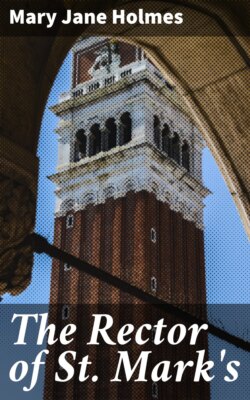Читать книгу The Rector of St. Mark's - Mary Jane Holmes - Страница 10
На сайте Литреса книга снята с продажи.
BLUE MONDAY.
ОглавлениеIt was to all intents and purposes "blue Monday" with the rector of St. Mark's, for, aside from the weariness and exhaustion which always followed his two services on Sunday, and his care of the Sunday school, there was a feeling of disquiet and depression, occasioned partly by that rencontre with pretty Lucy Harcourt, and partly by the uncertainty as to what Anna's answer might be. He had seen the look of displeasure on her face as she stood watching him and Lucy, and though to many this would have given hope, it only added to his nervous fears lest his suit should be denied. He was sorry that Lucy Harcourt was in the neighborhood, and sorrier still for her tenacious memory, which had evidently treasured up every incident which he could wish forgotten. With Anna Ruthven absorbing every thought and feeling of his heart, it was not pleasant to remember what had been a genuine flirtation between himself and the sparkling belle he had met among the Alps.
It was nothing but a flirtation, he knew, for in his inmost soul he absolved himself from ever having had a thought of matrimony connected with Lucy Harcourt. He had admired her greatly and loved to wander with her amid the Alpine scenery, listening to her wild bursts of enthusiasm, and watching the kindling light in her blue eyes, and the color coming to her thin, pale cheeks, as she gazed upon some scene of grandeur, nestling close to him as for protection, when the path was fraught with peril.
Afterwards, in Venice, beneath the influence of those glorious moonlight nights, he had been conscious of a deeper feeling which, had he tarried longer at the siren's side, might have ripened into love. But he left her in time to escape what he felt would have been a most unfortunate affair for him, for, sweet and beautiful as she was, Lucy was not the wife for a clergyman to choose. She was not like Anna Ruthven, whom both young and old had said was so suitable for him.
"And just because she is suitable, I may not win her, perhaps," he thought, as he paced up and down his library, wondering when she would answer his letter, and wondering next how he could persuade Lucy Harcourt that between the young theological student, sailing in a gondola through the streets of Venice, and the rector of St. Mark's, there was a vast difference; that while the former might be Arthur with perfect propriety, the latter should be Mr. Leighton, in Anna's presence, at least.
And yet the rector of St. Mark's was conscious of a pleasurable emotion, even now, as he recalled the time when she had, at his own request, first called him Arthur, her bird-like voice hesitating just a little, and her soft eyes looking coyly up to him, as she said:
"I am afraid that Arthur is hardly the name by which to call a clergyman."
"I am not in orders yet, so let me be Arthur to you. I love to hear you call me so, and you to me shall be Lucy," was his reply.
A mutual clasp of hands had sealed the compact, and that was the nearest to love-making of anything which had passed between them, if we except the time when he had said good-by, and wiped away a tear which came unbidden to her eye as she told him how lonely she would be without him.
Hers was a nature as transparent as glass, and the young man, who for days had paced the ship's deck so moodily, was fighting back the thoughts which had whispered that in his intercourse with her he had not been all guiltless, and that if in her girlish heart there was a feeling for him stronger than that of friendship he had helped to give it life.
Time and absence and Anna Ruthven had obliterated all such thoughts till now, when Lucy herself had brought them back again with her winsome ways, and her evident intention to begin just where they had left off.
"Let Anna tell me yes, and I will at once proclaim our engagement, which will relieve me from all embarrassments in that quarter," the clergyman was thinking, just as his housekeeper came up, bringing him two notes—one in a strange handwriting, and the other in the graceful, running hand which he recognized as Lucy Harcourt's.
This he opened first, reading as follows:
Prospect Hill, June—.
"Mr. Leighton: Dear Sir—Cousin Fanny is to have a picnic down in the west woods to-morrow afternoon, and she requests the pleasure of your presence. Mrs. Meredith and Miss Ruthven are to be invited. Do come.
"Yours truly,
"Lucy."
Yes, he would go, and if Anna's answer had not come before, he would ask her for it. There would be plenty of opportunities down in those deep woods. On the whole, it would be pleasanter to hear the answer from her own lips, and see the blushes on her cheeks when he tried to look into her eyes.
The imaginative rector could almost see those eyes, and feel the touch of her hand as he took the other note—the one which Mrs. Meredith had shut herself in her bedroom to write, and sent slyly by Valencia, who was to tell no one where she had been.
A gleam of intelligence shot from Valencia's eyes as she took the note and carried it safely to the parsonage, never yielding to the temptation to read it, just as she had read the one abstracted from the book, returning it when read to her mistress's pocket, where she had found it while the family were at church.
Mrs. Meredith's note was as follows:
